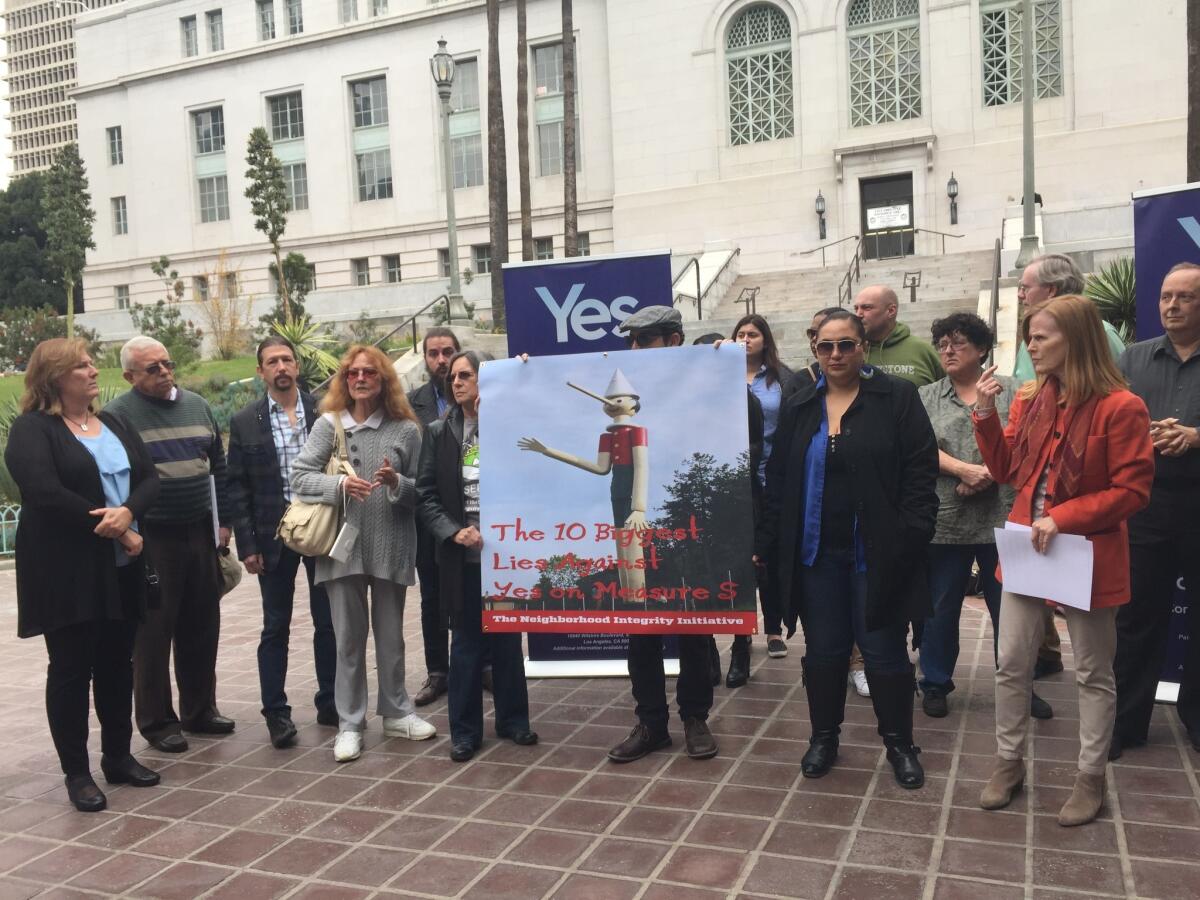Measure S opponents scale back claims in voter guide after being sued

- Share via
Opponents of a controversial measure that would restrict L.A. real estate development have agreed to scale back some of their claims submitted for a city voter guide after being sued by the initiative’s supporters.
Backers of Measure S, which would temporarily halt construction projects that require changes in city planning rules, had accused their opponents of submitting inaccurate statements for the guide, which will be mailed to voters ahead of the March election and includes arguments for and against the ballot measure.
The lawsuit, filed last month by attorney Grace Yoo, contended that it was misleading to call a critical study penned by Beacon Economics an “independent” analysis.
“It was bought and paid for — and so was the economist,” Jill Stewart, campaign director for the ballot measure, said at a news conference Wednesday outside Los Angeles City Hall.
The lawsuit also objected to claims about the economic impact of Measure S, arguing they were based on the false premise that real estate development would be restricted for a decade. The ballot measure includes a two-year moratorium on some construction projects, one of the most hotly contested parts of the plan.
Stewart said that opponents had agreed to all the changes that were being sought and that Measure S supporters would drop their lawsuit.
Under an agreement released Wednesday, opponents of the ballot measure will alter the disputed wording and no longer call the study “independent.”
They will also adjust their stated estimates from that study of the economic fallout of the proposal — including lost jobs and revenue — to reflect a two-year restriction instead of a decadelong one.
When the lawsuit was first filed, Measure S opponents had strenuously disputed its assertions, calling Beacon Economics an independent firm and saying that opponents had funded the study but “did not direct it.”
Opponents also said they believed that restrictions on development could ultimately last much longer than two years because of other requirements embedded in the measure — requirements that involve the lengthy process of updating community plans, said Josh Kamensky, spokesman for the opposition Coalition to Protect L.A. Neighborhoods and Jobs.
Stewart disputed those assertions Wednesday, arguing that such plans could be approved much more swiftly and reiterating that the moratorium would only last two years.
The agreement states that while opponents continue to deny the accusations in the lawsuit, both sides want to resolve the dispute without spending more money.
Both supporters and opponents of Measure S painted the agreement Wednesday as a victory: Stewart argued that opponents had caved because their arguments would not hold up in court. The Coalition to Protect L.A. Neighborhoods and Jobs countered that proponents had conceded that the ballot measure would have “devastating effects.”
“This is, in effect, them saying, ‘We recognize that this will cost 24,000 jobs … and we don’t care,’ ” Kamensky said Wednesday, referring to the amended claims that would appear in the voter guide.
Stewart dismissed that argument. “We’re not agreeing to their amended claims. They’re just trying to spin it,” she said.
The lawsuit was funded by the Coalition to Preserve L.A., which has been bankrolled chiefly by the AIDS Healthcare Foundation. The foundation has been locked in a legal battle with the city over a new building project in the works next door to its Hollywood headquarters.
Backers of Measure S argue that “mega-developments” are ruining neighborhoods, displacing longtime residents and worsening traffic. Their proposal to curb development has pitted them against labor, business and nonprofit groups that contend that imposing such restrictions would hurt the L.A. economy and exacerbate the city’s housing shortage.
Twitter: @LATimesEmily
More to Read
Sign up for Essential California
The most important California stories and recommendations in your inbox every morning.
You may occasionally receive promotional content from the Los Angeles Times.














